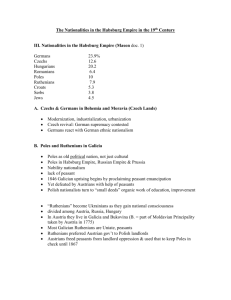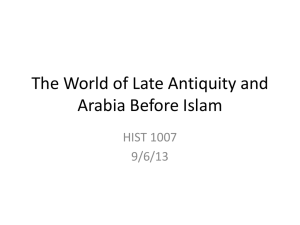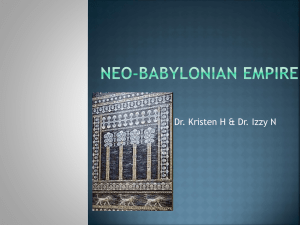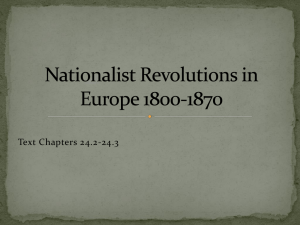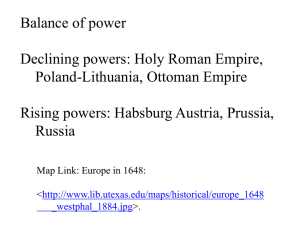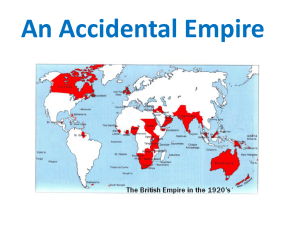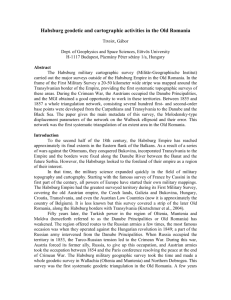The Dual Monarchy - NDAPEuropeanHistory
advertisement
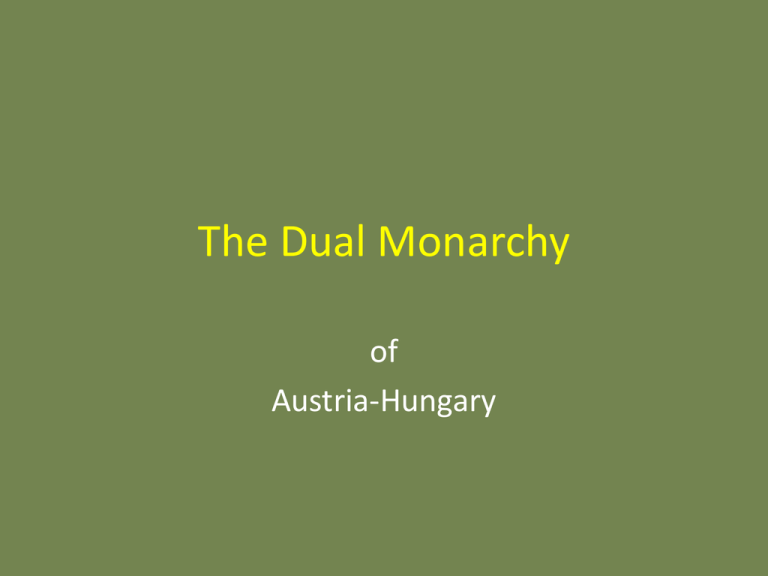
The Dual Monarchy of Austria-Hungary • After 1848 the Hapsburg Empire was a problem both to itself and for the rest of Europe. • As a critic remarked, “there was a standing army of soldiers, a kneeling army of priests, and a crawling army of informers that supported the empire.” • In the age of national states, liberal institutions, and industrialism, the Habsburg lands remained primarily dynastic, absolutist, and agrarian. • But the Habsburgs had proven their capacity to survive as many had tried unsuccessfully to dismember it. • After 1815, under Metternich, it guided the rest of Europe. Habsburg Response to 1848 • The response to the revolts of 1848-1849 had been the reassertion of absolutism. • Francis Joseph, who became emperor in 1848 and ruled until 1916, was honest and hardworking, but unimaginative. • He reacted to events – rarely commanded them. Francis Joseph’s Administration • During 1850s, his ministers attempted to impose a centralized administration on the empire. • The system amounted to a military and bureaucratic government dominated by German-speaking Austrians. • They abolished all internal tariffs in the empire. • They divided Hungary, which had been so revolutionary in 1848, into military districts. • The Roman Catholic Church controlled education. • Minorities, who had supported the empire against the Hungarians, received no rewards for their loyalty. • But even though this centralization of power brought internal resentment, the empire eventually faltered because of the setbacks in Habsburg foreign affairs. Foreign Policy • Austrian refusal to support Russia during the Crimean War meant that the new czar would no longer help preserve Habsburg rule in Hungary as Nicholas I had done in 1849. • The Austrian defeat in 1859 at the hands of France and Piedmont and the subsequent loss of territory in Italy confirmed the necessity for a new domestic policy. • For seven years the emperor, civil servants, aristocrats, and the politicians tried to construct a viable system of government. October Diploma • In 1860 Francis Joseph issued the October Diploma, which created a federation among the states and provinces of the empire. • There were to be local diets dominated by the landed classes and a single imperial parliament. • The Magyar nobility of Hungary, however, rejected the plan. February Patent • Consequently, in 1861, the emperor issued the February Patent, which set up an entirely different form of government. • It established a bicameral imperial parliament, or Reichsrat, with an upper chamber appointed by the emperor and an indirectly elected lower chamber. • Again the Magyars refused to cooperate in a system designed to give political dominance in the empire to German speaking Austrians. • Magyars sent no delegates to the legislature. Government until WWI • However, for the next 6 years, the February Patent governed the empire, and it prevailed in the Austria proper until World War I. • Ministers were responsible to the emperor, not the Reichsrat, and civil liberties were not guaranteed. • Armies could be levied and taxes raised without parliamentary consent. • When the Reichsrat was not in session, the emperor could simply rule by decree. Magyar Negotiations • Negotiations continued secretly between the emperor and the Magyars. • These produced no concrete result until the Prussian defeat of Austria in the summer of 1866 and the consequent exclusion of Austria from German affairs. • The military disaster compelled Francis Joseph to come to terms with the Magyars. Ausgleich • The Ausgleich, or Compromise of 1867, transformed the Habsburg Empire into a dual monarchy, thereafter generally known as Austria-Hungary. • Francis Joseph was crowned king of Hungary in Budapest in 1867. • Except for the common monarch, Austria and Hungary became almost wholly separate states. • They shared ministers of foreign affairs, defense, and finance, but the other ministers were different for each state. • The ideas behind the creation of Ausgleich were laid down in the memoirs of Count von Beust, the Austrian prime minister. http://www.fordham.edu/halsall/mod/1867beust.asp • There were also separate parliaments. • Each year, sixty parliamentary delegates from each state met to discuss mutual interests. • Every ten years, Austria and Hungary renegotiated their trade relationship. • By this cumbersome machinery, unique in European history, the Magyars were reconciled to Habsburg rule. • They had achieved the freehand they had long wanted in Hungary. Nationalities in the Dual Monarchy • The Compromise of 1867 had introduced two different principles of political legitimacy into the two sections of the Habsburg Empire. • In Hungary, political loyalty was based on nationality because Hungary had been recognized as a distinct part of the monarchy on the basis of nationalism. • In effect Hungary was a Magyar nation under the Habsburg emperor. • In the rest of the Habsburg domains, the principle of legitimacy meant dynastic loyalty to the emperor. • Many of the other nationalities wished to achieve the same type of settlement that the Hungarians had won, or to govern themselves, or to unite with fellow nationals who lived outside the empire. Map of Nationalities in AustriaHungary The Opposition to the Compromise • Many of those other national groups opposed the Compromise of 1867 that in effect had permitted German-speaking Austrians and the Hungarian Magyars to dominate all other nationalities within the empire. • The most vocal critics were the Czechs of Bohemia, who favored a policy of trialism, or triple monarchy, in which the Czechs would be given a position similar to that of the Hungarians. • In 1871 Francis Joseph was willing to accept this concept – the Magyars, however, were not. • The Magyars vetoed it lest they be forced to make similar concessions to their own subject nationalities. • Furthermore, the Germans of Bohemia were afraid that the Czech language would be imposed on them. • For more than 20 years, the Czechs were placated by generous patronage and posts in the bureaucracy. • By the 1890s, however, Czech nationalism again became more strident. • In 1897, Francis Joseph gave the Czechs and the Germans equality of language in various localities. • Thereafter, the Germans in the Austrian Reichsrat opposed these measures by disrupting Parliament. • The Czechs replied by using the same measures. Governmental Obstructionism • By the turn of the century, this obstructionism, which included playing musical instruments in the Reichscrat, had paralyzed parliamentary life. • The emperor ruled by imperial decree through the bureaucracy. • In 1907 Francis Joseph introduced universal male suffrage in Austria (but not in Hungary), but this action did not eliminate the chaos in the Reichscrat. • In effect, by 1914 constitutionalism was a dead letter in Austria. • It flourished in Hungary, but only because the Magyars relentlessly exercised political supremacy over all other competing national groups except Croatia, which was permitted considerable autonomy. Nationalism at End of 19th Century • There is reason to believe that nationalism became stronger during the last quarter of the 19th century. • It was then that language became the single most important factor in defining a nation – this was possible with the expansion of education. • In all countries where nationalistic groups prospered, their membership was dominated by intellectuals, students, and educated members of the middle class, all of whom were literate in the literary version of particular national languages. • It is also during this time, that racial thinking became important in Europe. • Racial thought maintained there was a genetic basis for ethnic and cultural groups who had before been generally defined by a common history and culture. • Once language and race became the ways to define an ethnic or national group, the lines between such groups became much more sharply drawn. Nationalism Ramifications Outside Austria-Hungary • The unrest of nationalities within the Habsburg Empire not only cause internal political difficulties, it also became a major source of political instability for all of central and eastern Europe. • Each of the nationality problems normally had ramifications for both foreign and domestic policy. • Both the Croats and Poles wanted an independent state in union with their fellow nationals who lived outside the empire, and in the case of the Poles, with fellow nationals in the Russian Empire. • Other national groups, such as the Ukrainians, Romanians, Italians, and Bosnians, saw themselves as potentially linked to Russia, Romania, Serbia, Italy, or to a yet-to-be established south Slavic, or Yugoslav state. • Many of these nationalities looked to Russia to protect their interests or influence the government in Vienna. • The Romanians were also concerned about the Romanian minority in Hungary. • Serbia sought to expand its borders to include Serbs who lived within Habsburg or Ottoman territory. • Out of these Balkan tensions emerged much of the turmoil that would spark World War I. • Many of the same ethnic tensions account for the warfare in the former Yugoslavia. Germans Within the Austro-Hungarian Empire • The dominant German population of Austria proper was generally loyal to the emperor. • A part of it, however, yearned to join the united German state being established by Bismarck. • Bismarck had united Germany, but he had also divided it, for he left about 1/6 of the Germans outside his German Empire and they were forced to work out a common future with a dozen other nationalities within Austrian lands. • These nationalistic Austro-Germans often hated the nonGerman national groups of the empire, and many of them were anti-semites. • Such attitudes would influence the youth and young adulthood of Adolph Hitler. Implications for Central and Eastern Europe • For the next century of European and even world history, the significance of this nationalist unrest within the late 19th century Austrian Empire and its neighbors can hardly be overestimated. • These nationality problems touched all three of the great central and eastern European empires – the German, the Russian, and the Austrian. • All had large Polish populations, an Russia had many minority groups. • Each nationality regarded its own aspirations and discontents as more important than the larger good or even the survival of the empires that they inhabited. • The weakness of the Ottoman Empire allowed both Austria and Russia to compete in the Balkans for greater influence and thus further inflame nationalistic resentments. • Such nationalistic stirrings affected the fate of all three empires from the 1860s through the outbreak of WWI. • The government of each of those empires would be overturned during the war, and the Austrian Empire would disappear. • These same unresolved problems of central and eastern European nationalism would then lead directly to World War II. • They continue to fester today.


